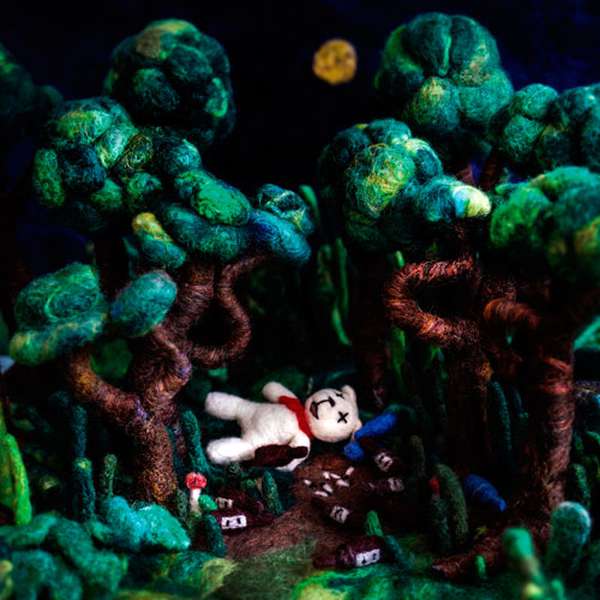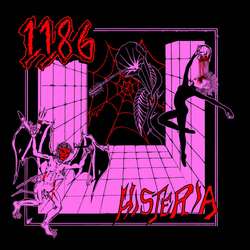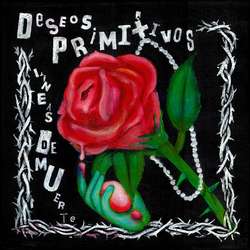If Nic Cage from Leaving Las Vegas had cut an album, it might sound something like Mishka Shubaly’s Coward’s Path. Dealing with such upbeat subjects as alcoholism, death, alcohol, loneliness, drugs, failure, and alcohol, these tunes were originally written in 2008 during a particularly out-of-control patch in the author’s life, and it doesn’t take a listener long to realize just how bad things were for Shubaly. Playing out over broke-down country instrumentation, Shubaly’s croaky vocals weave sad sack narratives, hanging over the music like a funereal veil. It’s hard to imagine these sorts of songs sung by anyone with a pleasant voice; that Shubaly’s is so imperfect actually benefits the material, with extremely rough production only adding to the devastating overall effect.
A gentle backwoods strum propels opener “Pickup Lines” forward, though the burpy, bass-range vocals ensure that this would have a more specialized audience than the typical mainstream country tune. If the album could be called somewhat predictable in terms of how the songs are constructed and play out, it’s compelling and even frequently amusing in its lyrics and themes. Presumably directed at a lonely female occupying a seat at a dimly lit bar approaching closing time, there’s a playful clumsiness to the whole of the opener which sets the stage for what’s to come later on the album. Follow-up “New Jersey Valentine’s Day Orphan Blues” lurches along to a Latin-flavored rhythm, with Shubaly seeming to cram as many syllables as possible into his lyrical stanzas. This approach means that a few songs here seem strained, with too many words packed into a confined space, but there’s also a part of me that feels the awkwardness in some of the songwriting adds to the overall aesthetic of the album. Regardless, the flow of the lyrical content is at its best on third track “Your Stupid Dreams,” a “demotivational” song loaded with pitch-black humor that’s easily a favorite of mine. Having had my own struggles with alcohol and drugs in my day, certain lines here really hit home – I love the sequence in which Shubaly lists off all sorts of miseries, ending the stanza with the line “but I had so much fucking fun // burning out at 29.”
“Frankenstein Heart” perhaps provides the most jaw-dropping insight into Shubaly’s drug use, a song that questions why and how the songwriter’s heart is still beating after all the abuse, while the slow and steady “Taxes & Jail” is probably the most sparse track here, with a lonely acoustic guitar accompanying the bellowing vocal. The shuffling “Ohio” tells the story of a disillusioned young woman and even includes a morose violin interlude before “I Can’t Remember” pops up as a comparatively uptempo piece that could almost work as a mainstream single. Sure, it’s a morose tune about remembering much relating to a former lover, but it at least operates at a level above being lethargic and potentially agonizing. Much as one could almost take the song “Alcoholism” as an apologetic number that finds the singer lamenting his unfortunate situation, it’s difficult to buy into any notion of regret when it’s followed by song entitled “Fuck Self-Control” that features lyrics like “I’m not wasting my time when I’m out getting wasted.”
Penultimate track “Eating Alone” seems to itself have been recorded after a particularly rough night: Shubaly’s voice is at its most raw here, coming close to shredding apart during a climax that finds him attempting to sing in a higher register than he probably should. Album closer “Your Plus One at My Funeral” finds the singer imagining his own funeral and wondering who a former lover will bring for moral support. Despite the bleak subject however, the song is the most gorgeously-arranged piece here, with a reserved, shuffling beat, a noisy, mid-track guitar solo, and melancholic organ droning in the background. This finale almost defeats my argument about the actual music on Coward’s Path being generally forgettable: I actually really like the instrumentation heard here.
Knowing absolutely nothing about Mishka Shubaly prior to giving this album a listen, I was sold primarily on the fact that every promotional mailing sent out about the release identified its creator (having been sober since 2009, Shubaly has found a fairly large degree of success writing memoirs and narratives) as an alcoholic first, musician and author second: how could I not appreciate what this guy had to offer? To say that I was a bit surprised by what Coward’s Path did deliver is an understatement: I typically don’t listen to neither singer-songwriter material nor country; despite this, I honestly enjoyed this album, at least partially due to the fact that I could relate to many of the stories being told. I think that would really be the key by which one could figure out if this release was for them: these songs revolve so heavily around that soul-crushing feel of having gotten heavily intoxicated the night before and done something stupid that those who haven’t experienced that might not appreciate or even grasp what Shubaly is going for. Additionally, the pitch black humor and genuinely depressing vibe of the album simply won’t be to everyone’s taste, but a select few out there will really dig this. Give it a listen if you’re feeling adventurous.




